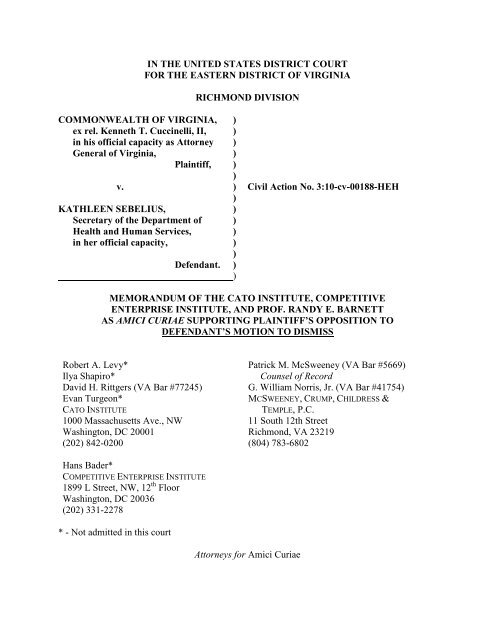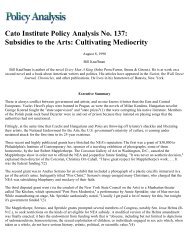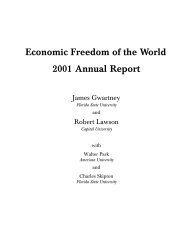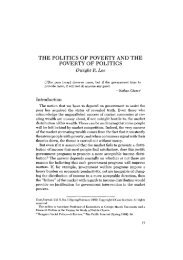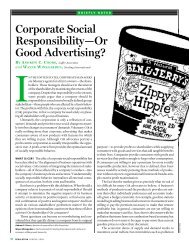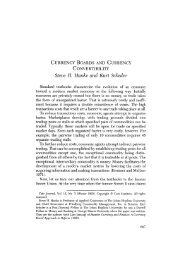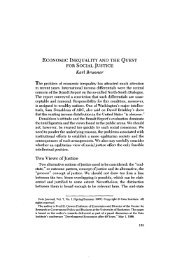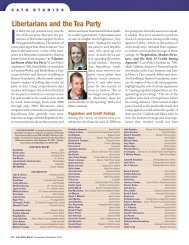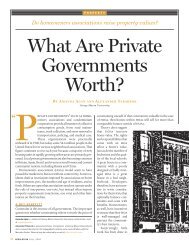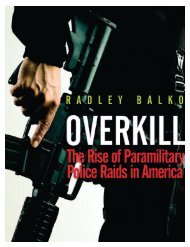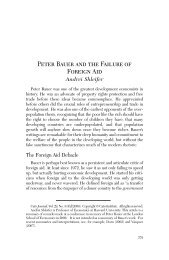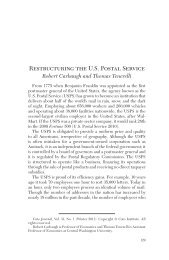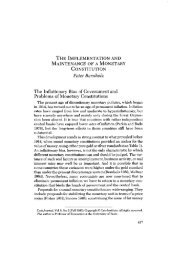Virginia v. Sebelius - Cato Institute
Virginia v. Sebelius - Cato Institute
Virginia v. Sebelius - Cato Institute
Create successful ePaper yourself
Turn your PDF publications into a flip-book with our unique Google optimized e-Paper software.
IN THE UNITED STATES DISTRICT COURT<br />
FOR THE EASTERN DISTRICT OF VIRGINIA<br />
RICHMOND DIVISION<br />
COMMONWEALTH OF VIRGINIA, )<br />
ex rel. Kenneth T. Cuccinelli, II, )<br />
in his official capacity as Attorney )<br />
General of <strong>Virginia</strong>, )<br />
Plaintiff, )<br />
)<br />
v. ) Civil Action No. 3:10-cv-00188-HEH<br />
)<br />
KATHLEEN SEBELIUS, )<br />
Secretary of the Department of )<br />
Health and Human Services, )<br />
in her official capacity, )<br />
)<br />
Defendant. )<br />
)<br />
MEMORANDUM OF THE CATO INSTITUTE, COMPETITIVE<br />
ENTERPRISE INSTITUTE, AND PROF. RANDY E. BARNETT<br />
AS AMICI CURIAE SUPPORTING PLAINTIFF’S OPPOSITION TO<br />
DEFENDANT’S MOTION TO DISMISS<br />
Robert A. Levy*<br />
Ilya Shapiro*<br />
David H. Rittgers (VA Bar #77245)<br />
Evan Turgeon*<br />
CATO INSTITUTE<br />
1000 Massachusetts Ave., NW<br />
Washington, DC 20001<br />
(202) 842-0200<br />
Hans Bader*<br />
COMPETITIVE ENTERPRISE INSTITUTE<br />
1899 L Street, NW, 12 th Floor<br />
Washington, DC 20036<br />
(202) 331-2278<br />
* - Not admitted in this court<br />
Patrick M. McSweeney (VA Bar #5669)<br />
Counsel of Record<br />
G. William Norris, Jr. (VA Bar #41754)<br />
MCSWEENEY, CRUMP, CHILDRESS &<br />
TEMPLE, P.C.<br />
11 South 12th Street<br />
Richmond, VA 23219<br />
(804) 783-6802<br />
Attorneys for Amici Curiae
CORPORATE & FINANCIAL DISCLOSURE STATEMENTS<br />
Pursuant to Local Rule 7.1 of the Eastern District of <strong>Virginia</strong> and to enable Judges and<br />
Magistrate Judges to evaluate possible disqualifications or recusal, the undersigned counsel for<br />
the <strong>Cato</strong> <strong>Institute</strong> (“<strong>Cato</strong>”) and the Competitive Enterprise <strong>Institute</strong> (“CEI”) in the above<br />
captioned action, certify that there are no parents, trusts, subsidiaries and/or affiliates of <strong>Cato</strong> or<br />
CEI that have issued shares or debt securities to the public.<br />
Pursuant to Fourth Circuit Local Rule 26.1, <strong>Cato</strong> <strong>Institute</strong> and CEI each declare that they<br />
are nonprofit public policy research foundations dedicated in part to the defense of constitutional<br />
liberties secured by law. <strong>Cato</strong> and CEI each state that they have no parent corporation. CEI<br />
issues no stock, while <strong>Cato</strong> has issued a handful of shares that are privately held by its directors.<br />
No publicly held corporation has a direct financial interest in the outcome of this litigation due to<br />
the participation of <strong>Cato</strong> or CEI.<br />
i
TABLE OF CONTENTS<br />
CORPORATE & FINANCIAL DISCLOSURE STATEMENTS ................................... i<br />
TABLE OF AUTHORITIES .......................................................................................... iii<br />
INTEREST OF AMICI CURIAE .....................................................................................1<br />
SUMMARY OF ARGUMENT ........................................................................................2<br />
ARGUMENT ....................................................................................................................4<br />
I. Every Act of Congress Must Have a Constitutional Source .................................4<br />
II. The Individual Mandate Is Not a Legitimate Exercise of the<br />
Necessary and Proper Clause ................................................................................6<br />
A. The Necessary and Proper Clause Limits Congressional Power ..............7<br />
1. “Shall Be” .............................................................................................7<br />
2. “Necessary”...........................................................................................8<br />
3. “Proper” ................................................................................................9<br />
4. “For Carrying Into Execution”..............................................................9<br />
5. “Powers Vested by this Constitution”.................................................10<br />
B. The Individual Mandate Cannot Be Based Solely on the<br />
Necessary and Proper Clause Because That Clause Does Not<br />
Grant Any Independent Constitutional Power ........................................11<br />
C. The Individual Mandate Cannot Be Predicated on Congress’ Power<br />
to Regulate Interstate Health Insurance Markets Because the<br />
Necessary and Proper Clause Cannot Mandate Economic Activity .......12<br />
III. The Individual Mandate Is Not a Legitimate Exercise of Congress’<br />
Taxing Power Because It Is Either a Regulation, an Unconstitutional Tax,<br />
or Must Be Justified Through Some Other Enumerated Power .........................15<br />
CONCLUSION ...............................................................................................................21<br />
CERTIFICATE OF COMPLIANCE ..............................................................................23<br />
CERTIFICATE OF SERVICE ......................................................................................24<br />
ii
Founding Documents<br />
TABLE OF AUTHORITIES<br />
The Declaration of Independence (U.S. 1776) .................................................................5<br />
Constitutional Provisions<br />
U.S. Const. art. I, § 1.........................................................................................................5<br />
U.S. Const. art. I, § 2.......................................................................................................19<br />
U.S. Const. art. I, § 8.............................................................................................. passim<br />
U.S. Const. art. I, § 9.......................................................................................................19<br />
U.S. Const. art. III, § 2 ....................................................................................................13<br />
U.S. Const. amend. VI ....................................................................................................13<br />
U.S. Const. amend. VII ...................................................................................................13<br />
U.S. Const. amend. X......................................................................................................10<br />
U.S. Const. amend. XVI .................................................................................................13<br />
Cases<br />
Bailey v. Drexel Furniture Co., 259 U.S. 20 (1922) ...................................................4, 20<br />
Brushaber v. Union Pacific R.R., 240 U.S. 1 (1916) ......................................................13<br />
Burroughs v. United States, 290 U.S. 534 (1934) ..........................................................14<br />
Butler v. United States, 297 U.S. 1 (1936) ................................................................ 16-17<br />
Ex Parte Milligan, 71 U.S. 1 (1866) .................................................................................4<br />
Fernandez v. Wiener, 326 U.S. 340 (1945) ....................................................................18<br />
Gonzales v. Raich, 545 U.S. 1 (2005) ................................................................... passim<br />
Heart of Atlanta Motel, Inc. v. United States, 379 U.S. 241 (1964) ...............................14<br />
iii
Helvering v. Davis, 301 U.S. 619 (1937) ........................................................................19<br />
Hodel v. Va. Surface Mining & Reclamation Ass’n, 452 U.S. 264 (1981) .....................14<br />
Katzenbach v. McClung, 379 U.S. 294 (1964) ...............................................................14<br />
Kinsella v. Singleton, 361 U.S. 234 (1960).....................................................................12<br />
M’Culloch v. Maryland, 17 U.S. (4 Wheat.) 316 (1819) ........................................ passim<br />
Marbury v. Madison, 5 U.S. (1 Cranch) 137 (1803) .........................................................5<br />
Murphy v. Internal Revenue Serv., 493 F.3d 170 (D.C. Cir. 2007) .......................... 18-19<br />
Printz v. United States, 521 U.S. 898 (1997) ................................................................4, 8<br />
Rosenberger v. Rector & Visitors of the Univ. of Va., 515 U.S. 819 (1995) ............ 16-17<br />
Sabri v. United States, 541 U.S. 600 (2004) ...................................................................14<br />
Selective Draft Law Cases, 245 U.S. 366 (1918) ...........................................................13<br />
Sonzinsky v. United States, 300 U.S. 506 (1937) ............................................................20<br />
United States v. Comstock, 560 U.S. __, 176 L.Ed.2d 878 (2010) ...................6, 9, 11, 12<br />
United States v. Kahriger, 345 U.S. 22 (1953) .........................................................17, 20<br />
United States v. Lopez, 514 U.S. 549 (1995) ............................................................ 4-5, 6<br />
United States v. Morrison, 529 U.S. 598 (2000) ........................................................5, 13<br />
United States v. Sanchez, 340 U.S. 42 (1950) ................................................................17<br />
Wickard v. Filburn, 317 U.S. 11 (1942) ...........................................................................3<br />
Statutes<br />
Patient Protection and Affordable Care Act, Pub. L. No. 111-148, 124 Stat. 119 (2010):<br />
§ 1501............................................................................................................16, 17<br />
§ 5000A ......................................................................................................... 17-18<br />
§ 9001-17 ............................................................................................................16<br />
iv
Other Authorities<br />
The Antifederalists (Cecelia M. Kenyon ed., 1985)........................................................10<br />
Randy E. Barnett, Can the Constitution Stop Health-Care Reform?, Wash. Post.,<br />
Mar. 21, 2010 ......................................................................................................14<br />
Randy E. Barnett, The Insurance Mandate in Peril, Wall St. J., Apr. 29, 2010 .............15<br />
Randy E. Barnett, The Original Meaning of the Necessary and Proper Clause,<br />
6 U. Pa. J. Const. L. 183 (2003) ................................................................8, 11, 12<br />
J. Randy Beck, The New Jurisprudence of the Necessary and Proper Clause,<br />
2002 U. Ill. L. Rev. 581 (2002)......................................................................... 8-9<br />
William Blackstone, Commentaries: With Notes of Reference to the Constitution<br />
and Laws of the Federal Government of the United States and of the<br />
Commonwealth of <strong>Virginia</strong> (1803) .....................................................................12<br />
Cong. Budget Office, The Budgetary Treatment of an Individual Mandate to<br />
Buy Health Insurance (1994) ................................................................................2<br />
The Federalist No. 33 (Alexander Hamilton) (Clinton Rossiter ed., 1961) ....................11<br />
The Federalist No. 37 (James Madison) (Clinton Rossiter ed., 1961) ..............................3<br />
The Federalist No. 44 (James Madison) (Clinton Rossiter ed., 1961) ............................11<br />
The Founders’ Constitution (Philip B. Kurland & Ralph Lerner eds., 1987) ..................8<br />
Nicholas Johnston & Kate Anderson Brower, Obama Standing Firm on<br />
No Middle Class Tax Increase, Gibbs Says, Bloomberg.com,<br />
Aug. 4, 2009, http://www.bloomberg.com/apps/news?pid=20601070<br />
&sid=axjWiIM9Wbb0 ........................................................................................15<br />
Gary Lawson & Patricia B. Granger, The “Proper” Scope of Federal Power:<br />
A Jurisdictional Interpretation of the Sweeping Clause,<br />
43 Duke L. J. 267 (1993) ........................................................................ 7-8, 9, 12<br />
Robert A. Levy, The Taxing Power of Obamacare, Nat’l Rev. Online,<br />
Apr. 20, 2010, http://article.nationalreview.com/431915/the-taxing-<br />
power-of-obamacare/robert-a-levy?page=1 ........................................................19<br />
Ilya Shapiro, State Suits Against Health Reform Are Well Grounded In Law—<br />
And Pose Serious Challenges, 29 Health Affairs 1229 (June 2010) ..................21<br />
v
Staff of Joint Comm. on Taxation, 111th Cong., Technical Explanation of the<br />
Revenue Provisions of the “Reconciliation Act of 2010,” as Amended,<br />
in Combination with the “Patient Protection and Affordable Care Act”<br />
(Comm. Print 2010) ............................................................................................16<br />
States Argue the Feds Can’t Force Purchase of Health Insurance, Wash. Post,<br />
Mar. 25, 2010 ........................................................................................................6<br />
George Stephanopoulos, Obama: Mandate is Not a Tax, ABC News,<br />
Sept. 20, 2009, http://blogs.abcnews.com/george/2009/09/<br />
obama-mandate-is-not-a-tax.html .......................................................................15<br />
vi
INTEREST OF AMICI CURIAE 1<br />
The <strong>Cato</strong> <strong>Institute</strong> (“<strong>Cato</strong>”) was established in 1977 as a nonpartisan public policy<br />
research foundation dedicated to advancing the principles of individual liberty, free markets, and<br />
limited government. <strong>Cato</strong>’s Center for Constitutional Studies was established in 1989 to<br />
promote the principles of limited constitutional government that are the foundation of liberty.<br />
Toward those ends, <strong>Cato</strong> publishes books and studies, conducts conferences, and publishes the<br />
annual <strong>Cato</strong> Supreme Court Review. It also files amicus briefs with the courts, including in cases<br />
focusing on the Commerce Clause and the Necessary and Proper Clause such as United States v.<br />
Morrison, 529 U.S. 598 (2000), Gonzales v. Raich, 545 U.S. 1 (2005), and United States v.<br />
Comstock, 560 U.S. __, 176 L.Ed.2d 878 (2010). The present case centrally concerns <strong>Cato</strong><br />
because it represents, without exaggeration, the federal government’s most egregious attempt to<br />
exceed its constitutional powers.<br />
The Competitive Enterprise <strong>Institute</strong> (“CEI”) is a public interest group founded in 1984<br />
and dedicated to free enterprise, limited government, and civil liberties. It studies and publishes<br />
on a wide range of regulatory issues, including those involving health and safety, drugs,<br />
biotechnology, and medical innovation—as well as the regulation of insurance markets. CEI<br />
attorneys have argued or participated as amicus curiae in numerous constitutional cases before<br />
the Supreme Court and other federal courts. Senior Attorney Hans Bader was also co-counsel in<br />
Morrison, the last Supreme Court decision to strike down a law as beyond Congress’ Commerce<br />
Clause powers.<br />
1 This amici curiae brief is filed upon motion for leave to file. The Plaintiff has consented to the<br />
participation of movants as amici in this case. The Defendant, when contacted through counsel,<br />
stated that she takes no position on movants’ motion for leave.
Prof. Randy E. Barnett is the Carmack Waterhouse Professor of Legal Theory at the<br />
Georgetown University Law Center. Prof. Barnett has taught constitutional law, contracts, and<br />
criminal law, among other subjects, and has published more than ninety articles and reviews, as<br />
well as eight books. His book, Restoring the Lost Constitution: The Presumption of Liberty<br />
(Princeton, 2004), and other scholarship concerns the original meaning of the Commerce and<br />
Necessary and Proper Clauses and their relationship to the powers enumerated in the<br />
Constitution. His constitutional law casebook, Constitutional Law: Cases in Context (Aspen<br />
2008), is widely used in law schools throughout the country. In 2004 he argued Gonzales v.<br />
Raich in the Supreme Court. In 2008, he was awarded a Guggenheim Fellowship in<br />
Constitutional Studies.<br />
SUMMARY OF ARGUMENT<br />
The new health care law is unprecedented—quite literally, without legal precedent—both<br />
in its regulatory scope and its expansion of federal authority over states and individuals. As the<br />
Congressional Budget Office said in 1994, “The government has never required people to buy<br />
any good or service as a condition of lawful residence in the United States.” Cong. Budget<br />
Office, The Budgetary Treatment of an Individual Mandate to Buy Health Insurance 1 (1994).<br />
Indeed, nor has it ever said that every man, woman, and child faces a civil penalty for declining<br />
to participate in the marketplace. And never before have courts had to consider such a<br />
breathtaking assertion of raw power—not even during the height of the New Deal, when the<br />
Supreme Court ratified Congress’ regulation of wheat grown for home consumption on the<br />
awkward theory that such behavior, when aggregated nationally, affected interstate commerce.<br />
2
Even in that case, Wickard v. Filburn, 317 U.S. 11 (1942), the federal government did not claim<br />
the power to mandate that people become farmers or enter into commercial transactions.<br />
In other words, this case presents the Court with “the arduous . . . task of marking the<br />
proper line of partition between the authority of the general and that of the State governments.”<br />
The Federalist No. 37, at 227 (James Madison) (Clinton Rossiter ed., 1961). At issue is the<br />
constitutionality of the individual health insurance mandate—the requirement that individuals<br />
obtain a government-approved health insurance policy or pay a penalty—and potentially, given<br />
the lack of a severability clause, the entire health care reform scheme. Congress identified the<br />
Commerce Clause as the source of its authority, a position the Government now asserts in its<br />
Motion to Dismiss. Because <strong>Virginia</strong> and other amici persuasively refute that argument, we<br />
confine ourselves here to explaining the fundamental flaws in the Government’s fall-back<br />
positions on the Necessary and Proper Clause and taxing power.<br />
Neither of the Government’s cursory arguments—comprising 9 pages of a 40 page brief<br />
that mainly relies on jurisdictional and Commerce Clause claims—legitimizes the individual<br />
mandate. The Necessary and Proper Clause is not an independent source of congressional<br />
power; instead, it enables Congress to carry out its enumerated powers or ends by means that are<br />
“appropriate” (Chief Justice Marshall’s term for “necessary”) and “plainly adapted to a<br />
[constitutional] end” (his definition of “proper”). M’Culloch v. Maryland, 17 U.S. (4 Wheat.)<br />
316, 421 (1819). Forcing someone to buy a product from a third party is not an “appropriate” or<br />
“proper” method “for carrying into Execution the foregoing Powers, and all other Powers vested<br />
by this Constitution in the Government of the United States.” U.S. Const. art. I, § 8, cl. 18.<br />
Even for matters within the scope of an enumerated power, Congress may not enact laws that are<br />
not “plainly adapted” to further an enumerated end, or that do so at the expense of the rights<br />
3
eserved to the States or the people under the Tenth Amendment. The Supreme Court enforced<br />
such limits in Printz v. United States, 521 U.S. 898 (1997), and should enforce such limits here,<br />
too.<br />
Similarly, the individual mandate is not a tax—its non-compliance penalty is a civil<br />
fine—but if it were, it would be unconstitutional because it is neither apportioned (if a direct tax)<br />
nor uniform (if an excise tax). Moreover, Congress cannot use the taxing power as a backdoor<br />
means of regulating an activity unless such regulation is authorized elsewhere in the<br />
Constitution. Bailey v. Drexel Furniture Co., 259 U.S. 20, 37-38 (1922).<br />
As the Supreme Court recognized almost 150 years ago, “[n]o graver question was ever<br />
considered by this court, nor one which more nearly concerns the rights of the whole,” than the<br />
Government’s unconstitutional assertion of power against its own citizens. Ex Parte Milligan,<br />
71 U.S. 1, 118-19 (1866) (granting habeas corpus petition). The motion to dismiss this lawsuit<br />
must be denied.<br />
ARGUMENT<br />
I. Every Act of Congress Must Have a Constitutional Source<br />
The federal government is one of delegated, enumerated, and thus limited powers:<br />
We start with first principles. The Constitution creates a Federal Government of<br />
enumerated powers. As James Madison wrote, the powers delegated by the<br />
proposed Constitution to the federal government are few and defined. Those<br />
which are to remain in the State governments are numerous and indefinite. This<br />
constitutionally mandated division of authority was adopted by the Framers to<br />
ensure protection of our fundamental liberties. Just as the separation and<br />
independence of the coordinate branches of the Federal Government serve to<br />
prevent the accumulation of excessive power in any one branch, a healthy balance<br />
of power between the States and the Federal Government will reduce the risk of<br />
tyranny and abuse from either front.<br />
4
United States v. Lopez, 514 U.S. 549, 552 (1995) (citations and quotations omitted). See also<br />
M’Culloch, 17 U.S. at 405 (“This government is acknowledged by all to be one of enumerated<br />
powers. The principle, that it can exercise only the powers granted to it . . . is now universally<br />
admitted.”). After all, when the Constitution was drafted, our nation had recently declared<br />
independence because “[t]he history of the present King of Great Britain is a history of repeated<br />
injuries and usurpations, all having, in direct object, the establishment of an absolute tyranny<br />
over these states.” The Declaration of Independence, para. 2 (U.S. 1776).<br />
In response to this “long train of abuses and usurpations,” our forefathers found it their<br />
“duty” not only “to throw off such government,” but also “to provide new guards for their<br />
security.” Id. The Constitution was that safeguard. See Marbury v. Madison, 5 U.S. (1 Cranch)<br />
137, 176 (1803) (“The powers of the legislature are defined and limited; and that those limits<br />
may not be mistaken, or forgotten, the constitution is written.”).<br />
To ensure that these fundamental limits are applied, “[e]very law enacted by Congress<br />
must be based on one or more of its powers enumerated in the Constitution.” United States v.<br />
Morrison, 529 U.S. 598, 607 (2000). Article I begins: “All legislative powers herein granted<br />
shall be vested in a Congress of the United States.” U.S. Const. art. I, § 1 (emphasis added).<br />
For the reasons discussed by <strong>Virginia</strong> and other amici, the Commerce Clause does not grant<br />
Congress the power to enact the individual health insurance mandate. For the reasons discussed<br />
below, neither the Necessary and Proper Clause nor the taxing power provide that authority<br />
either.<br />
5
II. The Individual Mandate Is Not a Legitimate Exercise of the Necessary and<br />
Proper Clause<br />
The Government argues that the individual mandate is “essential” to the overall health<br />
care reform. Def. Mot. at 30-33. That may or may not be true, 2 but it begs the question of<br />
whether Congress has the power in the first place to do what it is doing. That a statutory<br />
provision may be “essential” to some end is irrelevant to the question of whether the end itself is<br />
constitutional. As other amici note, “Raich does not stand for the broad proposition that<br />
Congress is free to pass otherwise unconstitutional laws by somehow connecting them to a larger<br />
regulatory program.” Br. Amici Curiae ACLJ et al. at 22 n.7. Instead, Congress’ ability to<br />
regulate commerce—using the Necessary and Proper Clause to execute Commerce Clause<br />
powers—extends to intrastate non-economic activity only insofar as failure to regulate such<br />
activity would undercut a broad federal regulatory scheme. Gonzales v. Raich, 545 U.S. 1, 17-18<br />
(2005). See also Lopez, 514 U.S. at 558-59 (“Congress’ commerce authority includes the power<br />
to regulate those activities . . . that substantially affect interstate commerce.”). Neither Raich nor<br />
Wickard authorized Congress to regulate non-activity. “When the inquiry is whether a federal<br />
law has sufficient links to an enumerated power to be within the scope of federal authority, the<br />
analysis depends not on the number of links in the congressional-power chain but on the strength<br />
of the chain.” Comstock, 560 U.S. __, 176 L.Ed.2d at 900 (Kennedy, J., concurring, slip op. at<br />
1).<br />
Here Congress is not merely attempting to regulate local economic activity that, in the<br />
aggregate, substantially affects commercial markets nationwide. Instead, it claims the authority<br />
2 Even supporters of the health care reform see alternatives to the individual mandate. See, e.g.,<br />
States Argue the Feds Can’t Force Purchase of Health Insurance, Wash. Post, Mar. 25, 2010, at<br />
A20 (“[W]hile the goal of the mandate is crucial to reform, the mandate isn’t the only way to<br />
achieve that goal.”).<br />
6
to force individuals not engaged in economic activity to become engaged. Assuming arguendo<br />
that this Court declines to find that authority in the Commerce Clause, the Necessary and Proper<br />
Clause is not a suitable backup.<br />
A. The Necessary and Proper Clause Limits Congressional Power<br />
The Necessary and Proper Clause gives Congress the power “[t]o make all Laws which<br />
shall be necessary and proper for carrying into Execution the foregoing Powers and all other<br />
Powers vested by this Constitution in the Government of the United States, or in any Department<br />
or Officer thereof.” U.S. Const. art. I, § 8, cl. 18. In order to guard against tyranny, the Clause<br />
limits congressional power in five ways: (1) it permits judicial review by stating that the limits<br />
specified by the Clause “shall be”; (2) it requires that laws be “necessary”; (3) it requires that<br />
laws be “proper”; (4) it permits within its scope only those laws that actually carry into execution<br />
those powers; and (5) it limits the scope of the Clause, which applies only to “Powers vested by<br />
the Constitution.”<br />
1. “Shall Be”<br />
Chief Justice Marshall explained that the Necessary and Proper Clause creates a basis for<br />
judicial review to circumscribe congressional action:<br />
Should congress, in the execution of its powers, adopt measures which are<br />
prohibited by the constitution; or should congress, under the pretext of executing<br />
its powers, pass laws for the accomplishment of objects not intrusted to the<br />
government; it would become the painful duty of this tribunal, should a case<br />
requiring such a decision come before it, to say, that such an act was not the law<br />
of the land.<br />
M’Culloch, 17 U.S. at 423. The requirement that the laws “shall be necessary and proper,” does<br />
not permit Congress to decide for itself what is necessary and what is proper, but instead<br />
7
provides a basis for judicial review. See Gary Lawson & Patricia B. Granger, The “Proper”<br />
Scope of Federal Power: A Jurisdictional Interpretation of the Sweeping Clause, 43 Duke L.J.<br />
267, 276 (1993) (“Lawson”), cited in Printz, 521 U.S. at 924; Randy E. Barnett, The Original<br />
Meaning of the Necessary and Proper Clause, 6 U. Pa. J. Const. L. 183, 208-15 (2003)<br />
(“Barnett”).<br />
The frequently quoted test for such review is: “Let the end be legitimate, let it be within<br />
the scope of the constitution, and all means which are appropriate, which are plainly adapted to<br />
that end, which are not prohibited, but consist with the letter and spirit of the constitution, are<br />
constitutional.” M’Culloch, 17 U.S. at 421. Courts must thus evaluate whether legislation is both<br />
necessary and proper. See Barnett at 215-20; Lawson at 307-08, citing Andrew Jackson, Veto<br />
Message, reprinted in 3 The Founders’ Constitution 263 (Philip B. Kurland & Ralph Lerner eds.,<br />
1987) (“This privilege . . . is not ‘necessary’ to enable the bank to perform its public duties, nor<br />
in any sense ‘proper,’ because it is vitally subversive of the rights of the States.”).<br />
When required, the Supreme Court has in fact relied upon the Necessary and Proper<br />
Clause to determine that a congressional act “was not the law of the land.” See Printz, 521 U.S.<br />
at 923-24 (Brady Act was not “proper” because it violated state sovereignty in executing the<br />
Commerce Clause).<br />
2. “Necessary”<br />
While “necessary” does not mean “absolutely necessary,” it certainly imposes limits.<br />
Barnett at 203-15. Courts ask whether legislation was really enacted to further the end on which<br />
its constitutionality was purportedly based. J. Randy Beck, The New Jurisprudence of the<br />
Necessary and Proper Clause, 2002 U. Ill. L. Rev. 581, 622 (2002). “The legislature must<br />
8
utilize means ‘really calculated to’ effect an end entrusted to its care, and may not use its<br />
constitutional powers as a ‘pretext’ for achieving other ends.” Id. at 612 (citing M’Culloch, 17<br />
U.S. at 423). The term “necessary” “requires an ‘appropriate’ link between a power conferred by<br />
the Constitution and the law enacted by Congress.” Comstock, 560 U.S. at __, 176 L.Ed.2d at<br />
904 (Alito, J., concurring, slip op. at 4).<br />
3. “Proper”<br />
In addition to being necessary, laws must also be proper. Proper regulation limits its own<br />
scope. See Comstock, 560 U.S. at __, 176 L.Ed.2d at 897 (Breyer, J., slip op. at 18) (“Neither is<br />
the statutory provision too sweeping in its scope.”). Accord Lawson at 271 (“[T]he word<br />
‘proper’ serves a critical . . . constitutional purpose by requiring executory laws to be peculiarly<br />
within Congress’s domain or jurisdiction . . . by requiring that such laws not usurp or expand the<br />
constitutional powers of any federal institutions or infringe upon the retained rights of the state<br />
or of individuals.”) (italics in original).<br />
4. “For Carrying into Execution”<br />
The Necessary and Proper Clause may be used to carry into effect only certain powers:<br />
“It is never the end for which other powers are exercised, but a means by which other objects are<br />
accomplished.” M’Culloch, 17 U.S. at 411. Moreover, “no matter how ‘necessary’ and ‘proper’<br />
an Act of Congress may be to its objective, Congress lacks authority to legislate if the objective<br />
is anything other than ‘carrying into execution’ one or more of the federal Government’s<br />
enumerated powers.” Comstock, 560 U.S. at __, 176 L.Ed.2d at 906 (Thomas, J., dissenting, slip<br />
op. at 3) (citing U.S. Const. art. I, § 8, cl. 18).<br />
9
5. “Powers Vested by this Constitution”<br />
The plain language of the Clause applies, by its own terms, first to “the foregoing<br />
powers,” and, second to “all other Powers vested by this Constitution.” The “foregoing powers”<br />
apply to those in Article I, Section 8, Clauses 1-17. The “other Powers vested by this<br />
Constitution” must be found within the Constitution itself because “[t]he powers not delegated to<br />
the United States by the Constitution, nor prohibited by it to the States, are reserved to the States<br />
respectively, or to the people.” U.S. Const. amend. X.<br />
Notwithstanding the text of the Clause, during the ratification debate, the<br />
“Antifederalists” expressed concern about a broad reading of it (akin to that advanced by the<br />
Government today):<br />
To the argument that no Bill of Rights was necessary because the Constitution<br />
was one of enumerated powers . . . the Antifederalists . . . pointed out the<br />
implications of the “necessary and proper” clause in combination with these<br />
broadly defined powers. If Congress had the power to make war, and decided that<br />
curtailment of freedom of the press was necessary and proper to this end, what<br />
was to prevent Congress from passing a law to this effect?<br />
The Antifederalists, at 1xx (Cecelia M. Kenyon, ed., 1985).<br />
For example, the thirteenth letter of “Agrippa,” dated January 14, 1788, argued that,<br />
based on the Necessary and Proper Clause, “By sect. 8 of article 1, Congress are to have the<br />
unlimited right to regulate commerce, external and internal, and . . . . They have indeed very<br />
nearly the same powers claimed formerly by the British parliament.” Id. at 142-43. Based upon<br />
this fear, the Antifederalists argued for adoption of the Bill of Rights, to clearly and<br />
unambiguously limit congressional power.<br />
Addressing these concerns, Alexander Hamilton explained that the Necessary and Proper<br />
Clause did not expand Congress’ powers beyond those enumerated in Article I, Section 8.<br />
10
Hamilton asked rhetorically: “What are the proper means of executing such a power but<br />
necessary and proper laws?” The Federalist No. 33, at 202. James Madison argued that the<br />
Clause was redundant because, even without it, Congress would enjoy the same powers by<br />
“unavoidable implication.” The Federalist No. 44, at 285.<br />
Hamilton thus reasoned that any reasonable fears of federal power could stem only from<br />
Congress’ enumerated powers: “If there be anything exceptionable, it must be sought for in the<br />
specific powers upon which this general declaration [the Clause] is predicated. The declaration<br />
itself, though it may be chargeable with tautology or redundancy, is at least perfectly harmless.”<br />
The Federalist No. 33, at 203.<br />
Thomas Jefferson, as president, similarly ridiculed the chain of inferences offered to<br />
sustain expansion of Congress’ powers:<br />
Congress are authorized to defend the nation. Ships are necessary for defense;<br />
copper is necessary for ships; mines are necessary for copper; a company is<br />
necessary to work mines; and who can doubt this reasoning who has ever played<br />
at “This is the House that Jack Built?” Under such a process of filiation of<br />
necessities the sweeping clause makes clean work.<br />
Barnett at 191 n.50 (citation omitted); Comstock, 560 U.S. at__, 176 L.Ed.2d at 900 (Kennedy,<br />
J., concurring, slip op. at 1) (adopting Jefferson’s analogy). The Government’s arguments here<br />
resonate with what Jefferson disparaged as a “filiation of necessities”; it must instead seek<br />
justification for the individual mandate in Hamilton’s “specific powers.”<br />
B. The Individual Mandate Cannot Be Based Solely on the Necessary and<br />
Proper Clause Because That Clause Does Not Grant Any Independent<br />
Constitutional Power<br />
As a consequence of its own textual limitations, the Necessary and Proper Clause is “not<br />
itself a grant of power, but a caveat that the Congress possesses all the means necessary to carry<br />
11
out the specifically granted ‘foregoing’ powers.” Kinsella v. Singleton, 361 U.S. 234, 247-48<br />
(1960). In other words, the Clause is an instrumental power, dependent on Congress’ other<br />
powers, not an independent power in and of itself.<br />
Scholars have held this view for over 200 years. See Barnett at 212-13, citing St. George<br />
Tucker, Appendix, in 1 William Blackstone, Commentaries: With Notes of Reference to the<br />
Constitution and Laws of the Federal Government of the United States and of the<br />
Commonwealth of <strong>Virginia</strong> 287 (1803) (“The plain import of the clause is, that congress shall<br />
have all the incidental or instrumental powers, necessary and proper for the carrying into<br />
execution all the express powers; . . . It neither enlarges any power specifically granted, nor is it<br />
a grant of new powers to congress, but merely a declaration, for the removal of all uncertainty,<br />
that the means of carrying into execution those otherwise granted, are included in the grant.”).<br />
Accord Lawson at 275 (with citations).<br />
Because the Necessary and Proper Clause is not an independent source of Congressional<br />
power, it cannot on its own support the individual mandate. The Government must instead rely<br />
on the Commerce Clause, or the taxing power, or some heretofore unidentified (but<br />
constitutionally enumerated) source of authority.<br />
C. The Individual Mandate Cannot Be Predicated on Congress’ Power to<br />
Regulate Interstate Health Insurance Markets Because the Necessary and<br />
Proper Clause Cannot Mandate Economic Activity<br />
“The Necessary and Proper Clause does not give Congress carte blanche.” Comstock,<br />
560 U.S. at __, 176 L.Ed.2d at 904 (Alito, J., concurring, slip op. at 4). The Government, in the<br />
two pages it devotes to the issue, contends that the individual mandate is justified under the<br />
Necessary and Proper Clause because it is “essential to Congress’s overall regulatory reform of<br />
12
the interstate health care and health insurance markets.” Def. Mot. at 34. Even if regulation of<br />
the interstate health insurance market is a valid exercise of Congress’ Commerce Clause power,<br />
it does not necessarily follow that the particular exercise here of that general authority is<br />
“proper.” Indeed, never, under any constitutional provision, has any U.S. court sustained a<br />
mandate to engage in economic activity.<br />
What is more, while Congress may comprehensively regulate certain industries, the<br />
Supreme Court has rejected the argument that it may regulate every activity that may affect those<br />
industries. See, e.g., Morrison, 529 U.S. at 615 (noting that such a “method of reasoning” should<br />
be “rejected as unworkable if we are to maintain the Constitution’s enumeration of powers”).<br />
Such logic applies a fortiori here: the failure to perform an act “affects” interstate commerce<br />
only in the self-evident but ultimately meaningless way that, for example, the failure to sell one’s<br />
house “affects” the real estate market. The “substantially affects” test has always been aimed at<br />
activity and never at inactivity. Extending this test to inactivity would permit Congress to<br />
require people to purchase any product on the ground that a failure to do so would affect the<br />
regulated industry.<br />
To be sure, there are exceptional situations in which the federal government may mandate<br />
individual activity. It can require registration for a military draft. Selective Draft Law Cases,<br />
245 U.S. 366 (1918). It can require people to serve on juries. U.S. Const. art. III, § 2; id.,<br />
amend. VI; id., amend. VII. It can require people to pay income taxes and file tax returns. Id.<br />
amend. XVI; Brushaber v. Union Pacific R.R., 240 U.S. 1 (1916) (upholding income tax laws<br />
and accompanying procedures). But these duties go to the heart of American citizenship. The<br />
draft relates to Congress’ explicit power “to raise and support armies.” U.S. Const. art. I, § 8, cl.<br />
12. Jury duty and income taxation similarly relate to explicit constitutional provisions. The<br />
13
existence of these duties of citizenship does not support a conclusion that Congress, for the first<br />
time in history, may properly impose mandates as a means of exercising its commerce power.<br />
Of course, Congress under its commerce power routinely mandates how business is<br />
conducted. For example, Congress can require hoteliers and restaurateurs to serve all patrons.<br />
Heart of Atlanta Motel, Inc. v. United States, 379 U.S. 241 (1964); Katzenbach v. McClung, 379<br />
U.S. 294 (1964). But nobody has to operate a hotel or restaurant—and individuals are not<br />
commercial enterprises. Congress has never claimed the power to mandate that private persons<br />
open their homes and kitchens to feed and house the public. “Even during World War II, the<br />
federal government did not mandate that individual citizens purchase war bonds.” Randy E.<br />
Barnett, Can the Constitution Stop Health Care Reform?, Wash. Post., Mar. 21, 2010, at B2.<br />
In none of the cases cited by the Government did the Necessary and Proper Clause do<br />
anything other than prohibit certain activities or regulate activities that people already engage in.<br />
See Raich, 545 U.S. 1 (2005) (prohibition on growing marijuana); Sabri v. United States, 541<br />
U.S. 600 (2004) (proscribing bribery of state, local and tribal officials); Hodel v. Va. Surface<br />
Mining & Reclamation Ass’n, 452 U.S. 264 (1981) (regulating coal mining); Burroughs v.<br />
United States, 290 U.S. 534 (1934) (criminalizing election-related corruption); M’Culloch, 17<br />
U.S. 316 (affirming Congress’ implied power to operate national bank, with which no state can<br />
interfere).<br />
In the end, the federal government has no authority to mandate the purchase of private<br />
health insurance. Yet here Congress has enacted a law “for the accomplishment of objects not<br />
intrusted to the [federal] government,” and, for this reason, it is “the painful duty of this tribunal,<br />
. . . to say, that such an act [is] not the law of the land.” M’Culloch, 17 U.S. at 423. It is not for<br />
14
a District Court to allow Congress to expand its power beyond where the Supreme Court limited<br />
it.<br />
III. The Individual Mandate Is Not a Legitimate Exercise of Congress’ Taxing<br />
Power Because It Is Either a Regulation, an Unconstitutional Tax, or Must Be<br />
Justified Through Some Other Enumerated Power<br />
The Supreme Court has never held that Congress can force individuals to engage in<br />
commerce so their actions can then be regulated under the Commerce Clause (as executed by the<br />
Necessary and Proper Clause). There is no controlling precedent for such regulatory<br />
bootstrapping. That’s why the Government had to devise the fallback position that the penalty<br />
for not buying health insurance is authorized under Congress’ power to “lay and collect taxes.”<br />
See, e.g., Randy E. Barnett, The Insurance Mandate in Peril, Wall St. J., Apr. 29, 2010, at A19.<br />
The Government’s invocation of Congress’ taxing power in the last few pages of its<br />
memorandum, however, fails on three counts:<br />
First: The penalty for violating the mandate is not a tax; it’s a fine. President Obama<br />
said as much by reaffirming his “vow not to raise taxes on middle-income Americans to deal<br />
with rising budget deficits or pay for an overhaul of the U.S. health-care system.” Nicholas<br />
Johnston & Kate Anderson Brower, Obama Standing Firm on No Middle Class Tax Increase,<br />
Gibbs Says, Bloomberg.com, Aug. 4, 2009, http://www.bloomberg.com/apps/news?pid=206<br />
01070&sid=axjWiIM9Wbb0. See also George Stephanopoulos, Obama: Mandate is Not a Tax,<br />
ABC News, Sept. 20, 2009, http://blogs.abcnews.com/george/2009/09/obama-mandate-is-not-a-<br />
tax.html.<br />
15
In the legislation itself, Congress justified the individual mandate under the Commerce<br />
Clause: “The individual responsibility requirement provided for in this section . . . is commercial<br />
and economic in nature, and substantially affects interstate commerce, as a result of the effects<br />
described in paragraph (2).” Patient Protection and Affordable Care Act (“PPACA”), Pub. L.<br />
No. 111-148, § 1501(a)(1), 124 Stat. 119 (2010). Paragraph (2) then begins: “The requirement<br />
regulates activity that is commercial and economic in nature: economic and financial decisions<br />
about how and when health care is paid for, and when health insurance is purchased.” Id.<br />
§ 1501(a)(2)(A). As <strong>Virginia</strong> points out, Pl. Mem. at 31, Congress levied “taxes” elsewhere in<br />
the legislation—for example, on “high cost” employer-sponsored insurance plans (the so-called<br />
“Cadillac plans”) and on “indoor tanning services”—so it presumably understands the<br />
distinction. Although a report by the Joint Committee on Taxation released two days before the<br />
president signed the legislation dubs the mandate an “Excise Tax on Individuals Without<br />
Essential Health Benefits Coverage,” the statute never describes the “penalty” it imposes for<br />
violating the mandate as an “excise tax”—expressly calling it a “penalty.” Staff of Joint Comm.<br />
on Taxation, 111th Cong., Technical Explanation of the Revenue Provisions of the<br />
“Reconciliation Act of 2010,” as Amended, in Combination with the “Patient Protection and<br />
Affordable Care Act” 2 (Comm. Print 2010).<br />
Furthermore, Congress listed all the revenue provisions of the health care reform for<br />
purposes of calculating how much revenue the legislation would generate but declined to include<br />
the penalty for failing to comply with the mandate. PPACA §§ 9001-17. Yet, for an exaction to<br />
be a true tax, it has to be a genuine revenue-raising measure. See, e.g., Rosenberger v. Rector &<br />
Visitors of the Univ. of Va., 515 U.S. 819, 841 (1995) (“‘A tax, in the general understanding of<br />
the term, and as used in the Constitution, signifies an exaction for the support of the<br />
16
Government.’”) (quoting Butler v. United States, 297 U.S. 1, 61 (1936)). When the courts have<br />
upheld taxes with a regulatory purpose—like the cigarette tax—it was because revenue-<br />
generation was still a key objective. See, e.g., United States v. Sanchez, 340 U.S. 42, 44 (1950)<br />
(When Congress uses its power constitutionally, it is well settled “that a tax does not cease to be<br />
valid merely because it regulates, discourages, or even definitely deters the activities taxed.”)<br />
(emphasis added).<br />
By contrast, the individual mandate exists solely to coerce people into acquiring health<br />
care coverage. Congress never mentions the taxing power with respect to the individual mandate<br />
and none of its eight findings mention raising any revenue with the penalty. See PPACA<br />
§ 1501(a). Indeed, if the mandate were to work perfectly—ensuring that everybody owned an<br />
insurance policy—it would raise exactly zero revenue. Congress simply did not enact the<br />
mandate pursuant to its taxing power. To the contrary, the statute expressly says that the<br />
mandate “regulates activity that is commercial and economic in nature.” Id. § 1501(a)(2)(A).<br />
In United States v. Kahriger, 345 U.S. 22, 28 (1953), the Supreme Court upheld a<br />
punitive tax on gambling by saying that “[u]nless there are provisions extraneous to any tax<br />
need, courts are without authority to limit the exercise of the taxing power.” In other words, the<br />
Court in Kahriger declined to look behind Congress’ assertion that it was exercising its taxing<br />
power to see whether a measure was really a regulatory penalty. But this principle cuts both<br />
ways: Neither can courts look behind Congress’ inadequate assertion of its commerce power to<br />
speculate as to whether a measure was “really” a tax.<br />
Moreover, while inserting the mandate into the Internal Revenue Code, Congress<br />
expressly severed the penalty from the tax code’s normal enforcement mechanisms. The failure<br />
to pay the penalty “shall not be subject to any criminal prosecution or penalty with respect to<br />
17
such failure.” PPACA § 5000A(g)(2)(A). Nor shall the IRS “file notice of lien with respect to<br />
any property of a taxpayer by reason of any failure to pay the penalty imposed by this section,”<br />
or “levy on any such property with respect to such failure.” Id. § 5000A(g)(2)(B).<br />
In short, the “penalty” is explicitly justified as a regulation of economic activity and not<br />
as a tax. While Congress need not specify what power it may be exercising, there is simply no<br />
authority for courts to recharacterize a regulation as a tax when doing so is contrary to Congress’<br />
express and actual regulatory purpose. Never before has the Court looked behind Congress’<br />
unconstitutional assertion of its commerce power to see if a measure could have been justified as<br />
a tax. For that matter, never before has a “tax” penalty been used to mandate, rather than<br />
discourage or prohibit, economic activity.<br />
The taxing power is, therefore, irrelevant because the individual mandate is a civil<br />
regulation with a civil fine for noncompliance.<br />
Second: If the penalty for noncompliance is nevertheless deemed to be a tax, it’s an<br />
unconstitutional one. The Constitution allows for three types of federal taxation, depending on<br />
the event that triggers their incidence: income, direct, and excise. Here, income is merely one of<br />
many factors that affect the amount of the individual mandate penalty—along with age, family<br />
size, geographic location, and smoking status—and not the tax trigger. Thus the penalty is not<br />
an income tax.<br />
Next, the Supreme Court has defined a direct tax as one “which falls upon the owner<br />
merely because he is the owner, regardless of his use or disposition of the property.” Fernandez<br />
v. Wiener, 326 U.S. 340, 362 (1945). “Only three taxes are definitely known to be direct: (1) a<br />
capitation . . . , (2) a tax upon real property, and (3) a tax upon personal property.” Murphy v.<br />
18
Internal Revenue Serv., 493 F.3d 170, 181 (D.C. Cir. 2007). The new penalty is not a<br />
capitation—a fixed tax levied on each person within a jurisdiction—because it is neither fixed<br />
(the amount differs based on the above-listed factors) nor levied on each person. It can be<br />
characterized most charitably as a negative tax on property, the triggering event being the non-<br />
ownership of an insurance policy. See Robert A. Levy, The Taxing Power of Obamacare,<br />
National Review Online, Apr. 20, 2010, http://article.nationalreview.com/431915/the-taxing-<br />
power-of-obamacare/robert-a-levy?page=1. But the Constitution requires that direct taxes be<br />
apportioned by population as determined by the census, U.S. Const. art. I, §§ 2, 9: First, decide<br />
the total revenue to be raised; second, allocate that amount among the states according to<br />
population; third, divide each state’s allocation by its population to compute an individual tax<br />
rate. Obviously, the individual mandate penalty is not calculated in this way. If the penalty is a<br />
direct tax, it is unconstitutional because it is not and cannot be apportioned.<br />
Finally, as the Government notes, certain other taxes, such as the Social Security payroll<br />
tax, have been classified as excises, which are levied on the performance of an act or the<br />
enjoyment of a privilege. Helvering v. Davis, 301 U.S. 619, 645 (1937). Although the term<br />
“excise” now covers virtually every internal revenue tax except the income tax, the individual<br />
mandate penalty (unlike Social Security) is not a tax on employment or other action—it “taxes”<br />
inaction. Nonetheless, even if it is an excise, the Constitution demands that “Excises shall<br />
be uniform throughout the United States,” U.S. Const. art. I, § 8, cl. 1, meaning taxed at the<br />
same rate throughout the country. The individual mandate penalty can depend in part on the cost<br />
of health insurance offered in the particular market. PPACA § 1501(b). That cost will depend in<br />
part on rating areas applicable within each state. PPACA § 1201. Thus, the individual mandate<br />
19
penalty can vary by location and, for that reason, would be unconstitutional as an excise tax for<br />
lack of uniformity.<br />
Third: Even if the penalty is considered a tax and somehow survives the test for<br />
apportionment or uniformity, Congress cannot use the taxing power as a backdoor means of<br />
regulating (as opposed to taxing) an activity unless the regulation is authorized elsewhere in the<br />
Constitution. While the Government is correct to point out that the taxing power is “extensive,”<br />
one of the few times the Supreme Court struck down a federal tax is instructive as to its limits.<br />
In the 1920s, when Congress wanted to prohibit activity that was then deemed to be solely within<br />
states’ police powers, it tried to penalize the activity using its tax power. The Supreme Court<br />
struck down such a penalty, saying, “there comes a time in the extension of the penalizing<br />
features of the so-called tax when it loses its character as such and becomes a mere penalty with<br />
the characteristics of regulation and punishment.” Bailey v. Drexel Furniture Co., 259. U.S. 20,<br />
38 (1922). Noting that that law’s “prohibitory and regulatory effect and purpose are palpable,”<br />
the Court held the penalty to be not a tax but rather a regulation of child labor. Id. at 37-38.<br />
In anticipation of the above argument, the Government cites, most strongly, Kahriger,<br />
345 U.S. 22. But there the Court also cited Bailey with approval and rejected the proposition<br />
“that Congress, under the pretense of exercising its power to tax has attempted to penalize illegal<br />
intrastate gambling through the regulatory features of the Act.” Id. at 24. See also Sonzinsky v.<br />
United States, 300 U.S. 506, 513-14 (1937) (“Inquiry into the hidden motives which may move<br />
Congress to exercise a power constitutionally conferred upon it is beyond the competency of<br />
courts.”). Thus, as stated above, this Court has no power to look behind Congress’ assertion of<br />
its commerce power and speculate as to whether the individual mandate was “really” a tax. The<br />
20
mandate is a regulatory tool explicitly designed to compel the purchase of health insurance. Tax<br />
penalties imposed for a regulatory purpose—as here, if the mandate penalty is considered a tax—<br />
must be authorized under an independent enumerated power.<br />
All roads lead to the Commerce Clause. And requiring all citizens to enter into a contract<br />
with a private company is an improper means of regulating interstate commerce.<br />
CONCLUSION<br />
<strong>Virginia</strong>’s challenge to the health care reform boils down to Congress’ authority to<br />
require people to buy private insurance. Finding the mandate constitutional would be the first<br />
interpretation of the Necessary and Proper Clause or the taxing power to permit the regulation of<br />
inactivity—in effect requiring an individual to engage in an economic transaction. “The federal<br />
government would then have wide authority to require that Americans engage in activities of its<br />
choosing, from eating spinach and joining gyms—in the health care realm—to buying cars from<br />
General Motors.” Ilya Shapiro, State Suits Against Health Reform Are Well Grounded In Law—<br />
And Pose Serious Challenges, 29 Health Affairs 1229, 1232 (June 2010). The constitutional<br />
limits imposed on the federal government must stand for something.<br />
Amici respectfully request that the Court deny the Defendant’s Motion to Dismiss.<br />
21
Respectfully submitted this 17 th day of June, 2010,<br />
Robert A. Levy*<br />
Ilya Shapiro*<br />
David H. Rittgers (VA Bar #77245)<br />
Evan Turgeon*<br />
CATO INSTITUTE<br />
1000 Massachusetts Ave., NW<br />
Washington, DC 20001<br />
(202) 842-0200<br />
Hans Bader*<br />
COMPETITIVE ENTERPRISE INSTITUTE<br />
1899 L Street, NW, 12 th Floor<br />
Washington, DC 20036<br />
(202) 331-2278<br />
* - Not admitted in this court<br />
/s/ G. William Norris, Jr.<br />
Patrick M. McSweeney (VA Bar #5669)<br />
Counsel of Record<br />
G. William Norris, Jr. (VA Bar #41754)<br />
MCSWEENEY, CRUMP, CHILDRESS &<br />
TEMPLE, P.C.<br />
11 South 12th Street<br />
Richmond, VA 23219<br />
(804) 783-6802<br />
Attorneys for Amici Curiae<br />
22
CERTIFICATE OF COMPLIANCE<br />
1. This brief complies with the type-volume limitation of Fed. R. App. P. 32(a)(7)(B) because<br />
this brief contains 6,328 words, excluding the parts of the brief exempted by Fed. R. App. P.<br />
32(a)(7)(B)(iii).<br />
2. This brief complies with the typeface requirements of Fed. R. App. P. 32(a)(5) and the type<br />
style requirements of Fed. R. App. P. 32(a)(6) because this brief has been prepared in a<br />
proportionally spaced typeface using Microsoft Word 2007 in Times New Roman, 12 point<br />
font.<br />
/s/ G. William Norris, Jr.<br />
Attorney for Amici Curiae<br />
Dated: June 17, 2010<br />
23
CERTIFICATE OF SERVICE<br />
I hereby certify that on the 17th day of June, 2010, I electronically filed the<br />
foregoing with the Clerk of Court using the CM/ECF system, which will send a<br />
notification of such filing (NEF) to the following:<br />
Earle Duncan Getchell, Jr.<br />
Charles E. James, Jr.<br />
Stephen R. McCullough<br />
Wesley Glenn Russell, Jr.<br />
Office of the Attorney General<br />
900 E. Main Street<br />
Richmond, <strong>Virginia</strong> 23219<br />
Jonathan Holland Hambrick<br />
Office of the U.S. Attorney<br />
600 E Main Street<br />
Suite 1800<br />
Richmond, VA 23219<br />
Erika Myers<br />
Ian Gershengorn<br />
Joel McElvain<br />
Sheila M. Lieber<br />
Department of Justice Federal Programs Branch<br />
20 Massachusetts Ave NW<br />
Room 7332<br />
Washington, DC 20001<br />
Colby M. May<br />
American Center for Law & Justice<br />
201 Maryland Ave., NE<br />
Washington, DC 20002<br />
/s/ G. William Norris, Jr.<br />
MCSWEENEY, CRUMP, CHILDRESS &<br />
TEMPLE, P.C.<br />
11 South 12th Street<br />
Richmond, VA 23219<br />
(804) 783-6802<br />
24


